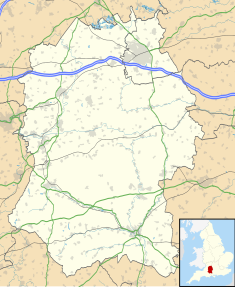Hannington Hall: Difference between revisions
←Created page with 'thumb|Hannington Hall '''Hannington Hall''' is a Grade II* listed country ho...' |
added infobox |
||
| (9 intermediate revisions by 6 users not shown) | |||
| Line 1: | Line 1: | ||
{{Use dmy dates|date=April 2022}} |
|||
| ⚫ | |||
| ⚫ | |||
{{Infobox historic site |
|||
| ⚫ | The house was built in 1653 by the Freke family, who had bought the estate in 1605, and |
||
| name = Hannington Hall |
|||
| designation1 = Grade II |
|||
| ⚫ | |||
| coordinates = {{Coord|51|38|13.56|N|1|44|38.4|W}} |
|||
| built = 1653 |
|||
| built_for = Freke family |
|||
| location = [[Hannington, Wiltshire]] |
|||
| locmapin = Wiltshire |
|||
}} |
|||
| ⚫ | |||
| ⚫ | Associated buildings such as the stable block, a well house, an ice house and the street wall and gate piers are all [[Grade II listed]] structures.<ref> {{cite web|url=https://historicengland.org.uk/listing/the-list/results?q=hannington+hall&searchtype=nhle|title=Search Results for |
||
| ⚫ | The house was built in 1653 by the Freke family, who had bought the estate in 1605, and possibly incorporates parts of a previous parsonage. The east front is of two and a half storeys in five bays, made of rubble with ashlar dressings. An orangery was added in 1836 and a service wing in 1863. An inscription below the front parapet celebrates the brotherly love of Raufe and William Freke, the sons of Sir Thomas Freke, the original owner.<ref>{{National Heritage List for England|num=1023333|desc=Hannington Hall|access-date=21 October 2016}}</ref> The house has twenty rooms and stands in 340 acres of pasture and woodland.<ref> {{cite web|url=https://www.bbc.co.uk/history/domesday/dblock/GB-416000-192000/page/11|title=HANNINGTON HALL, HANNINGTON |publisher= BBC|accessdate= 19 October 2016}} </ref> |
||
| ⚫ | |||
| ⚫ | |||
| ⚫ | Associated buildings such as the stable block, a well house, an ice house, and the street wall and gate piers are all [[Grade II listed]] structures.<ref> {{cite web|url=https://historicengland.org.uk/listing/the-list/results?q=hannington+hall&searchtype=nhle|title=Search Results for 'Hannington Hall'| publisher= Historic England|accessdate= 19 October 2016}} </ref> |
||
| ⚫ | |||
| ⚫ | |||
GWR [[Hall class]] locomotive No 5930 was named after the hall. |
|||
==References== |
==References== |
||
| Line 15: | Line 30: | ||
* [https://www.flickr.com/photos/bondmaster/sets/72157627348214288/ Flickr photos of the house] |
* [https://www.flickr.com/photos/bondmaster/sets/72157627348214288/ Flickr photos of the house] |
||
{{coord|51. |
{{coord|51.6371|-1.7440|type:landmark_region:GB|display=title}} |
||
[[Category:Grade II* listed buildings in Wiltshire]] |
[[Category:Grade II* listed buildings in Wiltshire]] |
||
[[Category:Grade II* listed houses]] |
[[Category:Grade II* listed houses]] |
||
[[Category:Country houses in Wiltshire]] |
[[Category:Country houses in Wiltshire]] |
||
[[Category:Houses completed in 1653]] |
|||
[[Category:1653 establishments in England]] |
|||
Latest revision as of 00:47, 8 August 2023
| Hannington Hall | |
|---|---|
 | |
| Location | Hannington, Wiltshire |
| Coordinates | 51°38′13.56″N 1°44′38.4″W / 51.6371000°N 1.744000°W |
| Built | 1653 |
| Built for | Freke family |
Listed Building – Grade II | |
Hannington Hall is a Grade II* listed country house in the village of Hannington, Wiltshire, England.
The house was built in 1653 by the Freke family, who had bought the estate in 1605, and possibly incorporates parts of a previous parsonage. The east front is of two and a half storeys in five bays, made of rubble with ashlar dressings. An orangery was added in 1836 and a service wing in 1863. An inscription below the front parapet celebrates the brotherly love of Raufe and William Freke, the sons of Sir Thomas Freke, the original owner.[1] The house has twenty rooms and stands in 340 acres of pasture and woodland.[2]
Associated buildings such as the stable block, a well house, an ice house, and the street wall and gate piers are all Grade II listed structures.[3]
The Hall passed down in the Freke family via Thomas Freke (1660–1721) MP, his Socinian writer brother William Freke, and the Hussey-Freke family.
During the Second World War it was occupied by the female Auxiliary Units' Special Duties Section, known as the "Secret Sweeties", under the command of Senior Commander Beatrice Temple, which was to form part of the British resistance movement in the event of a German invasion.
GWR Hall class locomotive No 5930 was named after the hall.
References
[edit]- ^ Historic England. "Hannington Hall (1023333)". National Heritage List for England. Retrieved 21 October 2016.
- ^ "HANNINGTON HALL, HANNINGTON". BBC. Retrieved 19 October 2016.
- ^ "Search Results for 'Hannington Hall'". Historic England. Retrieved 19 October 2016.

